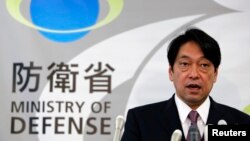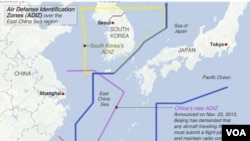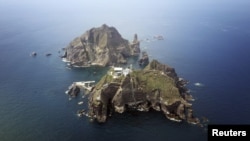SEOUL —
Japan has announced a large defense build-up and national security strategy aimed at countering China's increasingly assertive claims on disputed territory. The plan calls for increased air and maritime capabilities and comes just weeks after Beijing alarmed the region by unilaterally expanding its Air Defense Identification Zone (ADIZ) in the East China Sea.
Japan's Cabinet on Tuesday released details of its first defense spending increase in years, along with a national security plan designed with Chinese aggression in mind.
The five-year budget earmarks more than $230 billion for fighter jets, combat and amphibious vehicles, as well as surveillance drones and early warning aircraft.
The national security strategy is Japan's first since it formed a U.S.-style National Security Council to streamline defense policy.
It centers on Japan's southwest where Beijing is increasingly aggressive in a dispute over ownership of the Japan-administered Senkaku islands, known as Diaoyu in China.
The security policy underscores expanding the capabilities of Japan's Self Defense Forces in the face of Chinese intrusions. Prime Minister Shinzo Abe has championed re-defining Japan's pacifist military and spoke to journalists after the announcement.
He says the National Security Strategy shows Japan's diplomatic and security policy to the Japanese people, as well as the international community, with clarity and transparency. He says through international cooperation and their "proactive" peace policy, Japan will continue efforts to make even more of a contribution to international peace and stability.
Japan's Kyodo news agency reports under the security policy Tokyo will deepen defense relations with the United States and seek a more pro-active role for its Self-Defense Forces overseas.
Japan's neighbors, who suffered under its colonial rule and World War II aggression, are wary of Mr. Abe's efforts to redefine the role of Japan's military and pacifist constitution.
China's Foreign Ministry on Tuesday criticized Japan's defense policy. Spokeswoman Hua Chunying called on Japan to face up to history and not just talk peace but take constructive actions.
She says Japan's policy on military security affects the entire region's security environment. She says Asian countries, including China, as well as the international community are paying close attention to these negative trends and are maintaining high alert.
Tensions over history, and a separate island dispute, have kept relations between U.S. allies Japan and South Korea frigid while Seoul and Beijing bonded somewhat over their shared mistreatment.
But China was soundly criticized by Japan, South Korea, and the U.S. in late November for abruptly announcing the expansion of its Air Defense Identification Zone in the East China Sea.
The new ADIZ overlaps international waters as well as the islands disputed with Japan and a South Korean occupied reef, raising the risk of conflict.
South Korea's Foreign Ministry rebuked Japan for including the disputed Dokdo islands, known as Takeshima in Japan, in its security strategy. But spokesman Cho Tai-young stopped short of criticizing Japan's military build-up.
He says there must be no case affecting stability in the region. He says the government's position is that Japan's defense and security program must be done in a transparent way, respecting the ideology of its peaceful constitution and the principle of its exclusively defensive security policy.
Jeff Kingston, director of Asian Studies at Japan's Temple University, says China's expanded air defense zone has pushed Seoul, Tokyo, and Washington closer together.
“And, Japan's reaction to Seoul's announcement of its own expanded ADIZ was very low key even though it overlaps the Japanese ADIZ. So, I think that we're far from a thaw in Korean-Japanese relations but, compared to what's been going over the last year, I guess this is one of the more encouraging signs,” said Kingston.
Japan's national security strategy also notes concerns about North Korea's nuclear weapons and missile programs and budgets for two new Aegis missile destroyers.
The strategy will also set up new guidelines for joint development and production of arms exports. Tokyo in 2011 lifted a four-decade-old ban on weapons exports but has been cautious to grow its defense industry.
VOA Seoul Bureau producer Youmi Kim contributed to this report.
Japan's Cabinet on Tuesday released details of its first defense spending increase in years, along with a national security plan designed with Chinese aggression in mind.
The five-year budget earmarks more than $230 billion for fighter jets, combat and amphibious vehicles, as well as surveillance drones and early warning aircraft.
The national security strategy is Japan's first since it formed a U.S.-style National Security Council to streamline defense policy.
It centers on Japan's southwest where Beijing is increasingly aggressive in a dispute over ownership of the Japan-administered Senkaku islands, known as Diaoyu in China.
The security policy underscores expanding the capabilities of Japan's Self Defense Forces in the face of Chinese intrusions. Prime Minister Shinzo Abe has championed re-defining Japan's pacifist military and spoke to journalists after the announcement.
He says the National Security Strategy shows Japan's diplomatic and security policy to the Japanese people, as well as the international community, with clarity and transparency. He says through international cooperation and their "proactive" peace policy, Japan will continue efforts to make even more of a contribution to international peace and stability.
Japan's Kyodo news agency reports under the security policy Tokyo will deepen defense relations with the United States and seek a more pro-active role for its Self-Defense Forces overseas.
Japan's neighbors, who suffered under its colonial rule and World War II aggression, are wary of Mr. Abe's efforts to redefine the role of Japan's military and pacifist constitution.
China's Foreign Ministry on Tuesday criticized Japan's defense policy. Spokeswoman Hua Chunying called on Japan to face up to history and not just talk peace but take constructive actions.
She says Japan's policy on military security affects the entire region's security environment. She says Asian countries, including China, as well as the international community are paying close attention to these negative trends and are maintaining high alert.
Tensions over history, and a separate island dispute, have kept relations between U.S. allies Japan and South Korea frigid while Seoul and Beijing bonded somewhat over their shared mistreatment.
But China was soundly criticized by Japan, South Korea, and the U.S. in late November for abruptly announcing the expansion of its Air Defense Identification Zone in the East China Sea.
The new ADIZ overlaps international waters as well as the islands disputed with Japan and a South Korean occupied reef, raising the risk of conflict.
South Korea's Foreign Ministry rebuked Japan for including the disputed Dokdo islands, known as Takeshima in Japan, in its security strategy. But spokesman Cho Tai-young stopped short of criticizing Japan's military build-up.
He says there must be no case affecting stability in the region. He says the government's position is that Japan's defense and security program must be done in a transparent way, respecting the ideology of its peaceful constitution and the principle of its exclusively defensive security policy.
Jeff Kingston, director of Asian Studies at Japan's Temple University, says China's expanded air defense zone has pushed Seoul, Tokyo, and Washington closer together.
“And, Japan's reaction to Seoul's announcement of its own expanded ADIZ was very low key even though it overlaps the Japanese ADIZ. So, I think that we're far from a thaw in Korean-Japanese relations but, compared to what's been going over the last year, I guess this is one of the more encouraging signs,” said Kingston.
Japan's national security strategy also notes concerns about North Korea's nuclear weapons and missile programs and budgets for two new Aegis missile destroyers.
The strategy will also set up new guidelines for joint development and production of arms exports. Tokyo in 2011 lifted a four-decade-old ban on weapons exports but has been cautious to grow its defense industry.
VOA Seoul Bureau producer Youmi Kim contributed to this report.







